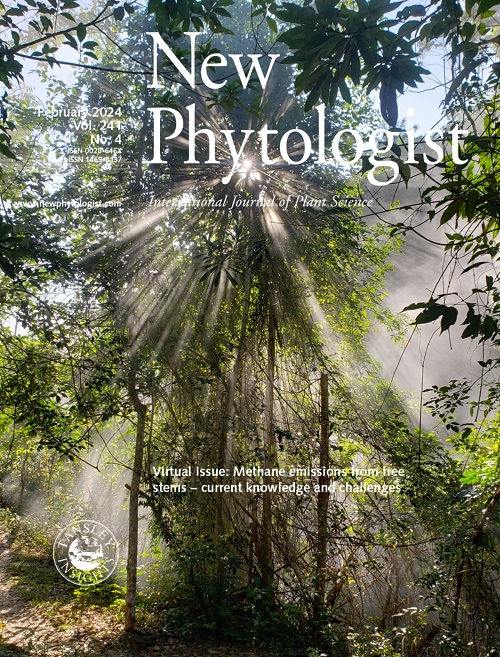Parallel selection of loss-of-function alleles of Pdh1 orthologous genes in warm-season legumes for pod indehiscence and plasticity is related to precipitation
IF 8.1
1区 生物学
Q1 Agricultural and Biological Sciences
引用次数: 0
Abstract
- Pod dehiscence facilitates seed dispersal in wild legumes but results in yield loss in cultivated legumes. The evolutionary genetics of the legume pod dehiscence trait remain largely elusive.
- We characterized the pod dehiscence of chromosome segment substitution lines of Glycine max crossed with Glycine soja and found that the gene underlying the predominant quantitative trait locus (QTL) of soybean pod-shattering trait was Pod dehiscence 1 (Pdh1). A few rare loss-of-function (LoF) Pdh1 alleles were identified in G. soja, while only an allele featuring a premature stop codon was selected for pod indehiscence in cultivated soybean and spread to low-precipitation regions with increased frequency. Moreover, correlated interactions among Pdh1's haplotype, gene expression, and environmental changes for the developmental plasticity of the pod dehiscence trait were revealed in G. max.
- We found that orthologous Pdh1 genes specifically originated in warm-season legumes and their LoF alleles were then parallel-selected during the domestication of legume crops.
- Our results provide insights into the convergent evolution of pod dehiscence in warm-season legumes, facilitate an understanding of the intricate interactions between genetic robustness and environmental adaptation for developmental plasticity, and guide the breeding of new legume varieties with pod indehiscence.
暖季豆科植物Pdh1同源基因功能缺失等位基因的平行选择与降水有关
豆荚开裂有利于野生豆类的种子传播,但会导致栽培豆类的产量损失。豆荚开裂特性的进化遗传学在很大程度上仍然难以捉摸。我们对大豆与大豆杂交的染色体片段替代品系的裂荚进行了表征,发现大豆裂荚性状的主要数量性状基因座(QTL)为裂荚1(Pdh1)。在大豆中发现了一些罕见的功能丧失(LoF)Pdh1等位基因,而在栽培大豆中只选择了一个具有过早终止密码子的等位基因来进行豆荚不裂,并以增加的频率传播到低降水区。此外,Pdh1的单倍型、基因表达、,揭示了G.max裂荚性状发育可塑性的环境变化。我们发现,在豆科作物的驯化过程中,同源Pdh1基因特异性起源于暖季豆类,然后平行选择了它们的LoF等位基因。我们的研究结果为暖季豆科植物裂荚的趋同进化提供了见解,有助于理解遗传稳健性和环境适应对发育可塑性之间的复杂相互作用,并指导具有裂荚的豆科新品种的选育。
本文章由计算机程序翻译,如有差异,请以英文原文为准。
求助全文
约1分钟内获得全文
求助全文
来源期刊

New Phytologist
PLANT SCIENCES-
CiteScore
17.60
自引率
5.30%
发文量
728
审稿时长
1 months
期刊介绍:
New Phytologist is a leading publication that showcases exceptional and groundbreaking research in plant science and its practical applications. With a focus on five distinct sections - Physiology & Development, Environment, Interaction, Evolution, and Transformative Plant Biotechnology - the journal covers a wide array of topics ranging from cellular processes to the impact of global environmental changes. We encourage the use of interdisciplinary approaches, and our content is structured to reflect this. Our journal acknowledges the diverse techniques employed in plant science, including molecular and cell biology, functional genomics, modeling, and system-based approaches, across various subfields.
 求助内容:
求助内容: 应助结果提醒方式:
应助结果提醒方式:


